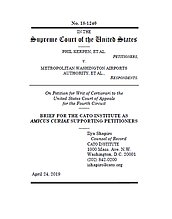When Congress gives significant power to another body—whether an executive agency or an interstate compact—it is delegating authority. But congressional authority is limited to the powers listed in Article I of the Constitution, and it certainly can’t grant power that it doesn’t have.
In 1986, Congress authorized the Metropolitan Washington Airports Authority (MWAA)—an interstate compact—to take over for the federal government in managing Reagan and Dulles Airports and the Dulles Toll Road, all of which are federal assets on federal land. A group of Virginia taxpayers and toll-road users, upset that the MWAA was raising tolls to pay for an extension of the Washington Metro, filed a class action against the MWAA, arguing in part that it was exercising improperly delegated authority. The U.S. Court of Appeals for the Fourth Circuit held that Congress did not delegate authority to the MWAA and so there was no separation of powers problem. Bizarrely, it stated that the power to operate airports on federal land is not “inherently federal.”
Yet, as the Supreme Court established in Department of Transportation v. Association of American Railroads (2015), when the government creates an entity, controls it, and the entity serves a federal interest, it is exercising federal power. Since the MWAA’s authority fits this description, Congress certainly granted it federal power. Congress goes against the separation of powers doctrine, however, when it gives power to other bodies just to avoid the time, energy, and hard decisions involved in legislating.
Further, the Fourth Circuit was wrong to draw a distinction between federal and “inherently federal” authority. As the Supreme Court has long understood, federal power is not split between “inherent” or general federal power, but rather between the branches of government. The only types of federal authority are those enshrined in the Constitution: legislative, executive, and judicial. Thus, allfederal power is “inherently federal.”
Since Congress possesses only “inherently” federal power, the lower court created uncertainty about whether Congress has the authority to control airports. If it can control airports, the Fourth Circuit was mistaken and Congress delegated inherently federal authority to the MWAA. If Congress didn’t have the authority in the first place, then where does the MWAA get its regulatory power in the first place? Either way, Congress can’t delegate power it doesn’t have.
Cato has filed a brief supporting the plaintiffs’ request that asking the Supreme Court to resolve uncertainty regarding the definition of federal power. We argue that grants of federal power come from Congress—and that federal power is the only kind of power Congress has. The Constitution demands that each branch shoulder the responsibility entrusted to it, no matter how politically expedient it would be to let another entity bear the burden.



